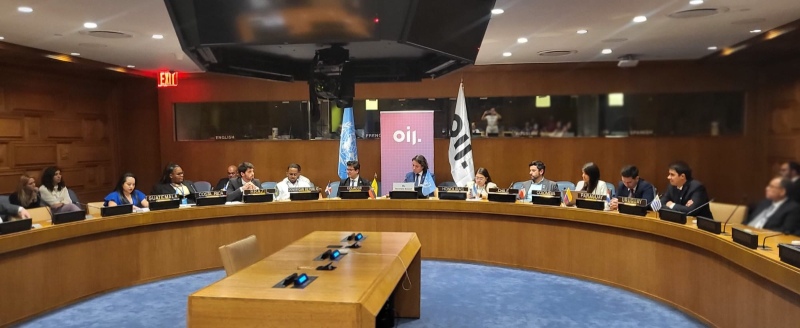Members of the International Youth Organization (IYO), directors, ministers, and youth secretaries from Latin American countries gathered to establish political agreements aimed at building the new youth agenda. Leading the meeting, Secretary-General Max Trejo emphasized the importance of a joint effort to position young people as solutions and agents of transformation. Additionally, he previewed next year’s “Summit of the Future,” a global event designed to address inequalities in global governance and restore international cooperation.
In his speech, Trejo highlighted the need for bilateral consultation with states and advocated for mandatory multilateralism to achieve an agenda that is a common effort of all relevant actors, leveraging all necessary resources.

Starting Points for the New Youth Agenda
The meeting addressed various crucial points that will serve as starting points for the construction of the new agenda:
Training, Digitalization, and Capacity Building : The development of digital skills and essential capabilities was identified as a fundamental component to empower youth in an increasingly technological world.
Employment Integration and Productive Autonomy: The need for dignified employment was emphasized as a crucial requirement for the productive autonomy of young people.
Housing and Emancipation: Ensuring access to housing and emancipation were highlighted as key aspects for youth well-being.
Health and Well-being: Attention to health and well-being was recognized as essential for the comprehensive development of youth.
Participation, Empowerment, and Social Transformation: Fostering active participation, empowering young people, and promoting social transformation were identified as essential goals.
Rural Areas and Social Integration: Addressing the specific needs of youth in rural environments and promoting social integration were considered key aspects.
Knowledge and Evidence Generation : The importance of promoting knowledge and evidence generation to support effective policies was emphasized.
Gender, Equality, and Diversity: The inclusion of gender, equality, and diversity approaches was established as a fundamental commitment for the new agenda.
Climate Change and Sustainability: Addressing climate change and promoting sustainable practices were recognized as unavoidable responsibilities.
Disability and Social Inclusion: The inclusion of people with disabilities and the promotion of social inclusion were highlighted as fundamental principles.
Migration and Human Mobility: Considering challenges related to migration and human mobility was a crucial point for the youth agenda.
Institutional Strengthening: The need to strengthen institutions to ensure the effective implementation of the new agenda was acknowledged.
Rights and Citizenship: Protecting rights and promoting active citizenship among young people were emphasized as essential objectives.
Peacebuilding and Security: The contribution of youth to peacebuilding and security was identified as a key component.
Culture and Creative Industries: The importance of culture and creative industries for youth development and the expression of identities were highlighted as crucial aspects.
Technical Deployment and Development of the New Agenda
Despite these starting points, it is clear that the new agenda requires detailed technical deployment. Specific focus areas need to be identified, tailored programs developed, resources strategically allocated, and clear responsibilities established. Close collaboration with states, civil society, and other actors will be essential to ensure the success of this initiative.
The IYO meeting marks a significant milestone in the search for solutions to the challenges facing young people. Building the new youth agenda not only represents a commitment to the present but also an investment in the future, where active participation and inclusion of youth are crucial for a more equitable and sustainable world.
In the fabric of these deliberations, a collective commitment emerges towards a horizon where young people are not just spectators but the drivers of real change. The new youth agenda, meticulously outlined in this international dialogue, is not merely a set of goals; it is the manifestation of a shared vision of a future where youth not only claims its space but defines it. As each strategic point weaves into this tapestry of possibilities, it becomes clear that we are not facing a mere plan but the tangible promise of a tomorrow where young people are the true architects of their destiny and the society they yearn for and deserve. This renewed commitment resonates as an echo of hope, reverberating beyond these reflections, towards concerted action that will shape the dawn of a new era for future generations.
Disclaimer: The views, suggestions, and opinions expressed here are the sole responsibility of the experts. No Current Hue journalist was involved in the writing and production of this article.
